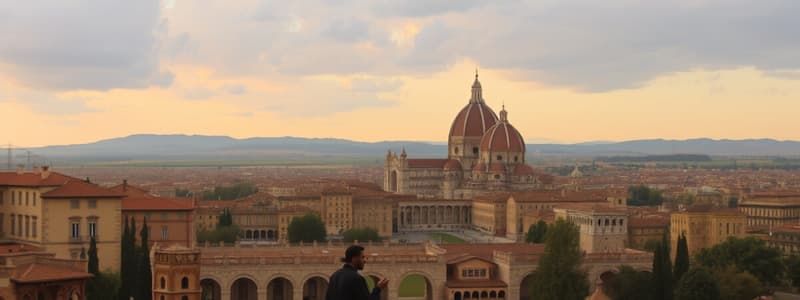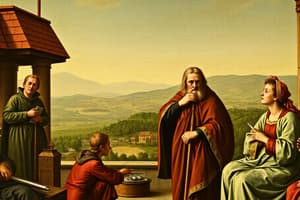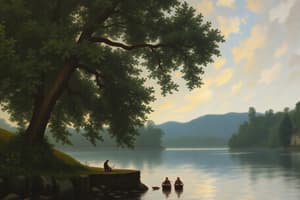Podcast
Questions and Answers
What was the Renaissance?
What was the Renaissance?
The great rebirth of art, literature, and learning in the 14th, 15th, and 16th centuries which marked the transition from the medieval to modern periods of European history.
When did the Renaissance take place?
When did the Renaissance take place?
The 14th, 15th, and 16th centuries.
Why did the Renaissance begin in Italy?
Why did the Renaissance begin in Italy?
Due to their diverse governing system, prime trade location, rich economy, and proximity to Roman culture.
Where did the Renaissance spread to?
Where did the Renaissance spread to?
Where did the Renaissance begin?
Where did the Renaissance begin?
Who were the Medici and why were they important?
Who were the Medici and why were they important?
What art style was popular during the Renaissance?
What art style was popular during the Renaissance?
What were some of Leonardo Da Vinci's accomplishments?
What were some of Leonardo Da Vinci's accomplishments?
Why is Leonardo Da Vinci considered a Renaissance man?
Why is Leonardo Da Vinci considered a Renaissance man?
Define humanism.
Define humanism.
Why was humanism important during the Renaissance?
Why was humanism important during the Renaissance?
What did Michelangelo accomplish?
What did Michelangelo accomplish?
Who painted the Mona Lisa and the Last Supper?
Who painted the Mona Lisa and the Last Supper?
Define vernacular.
Define vernacular.
Flashcards are hidden until you start studying
Study Notes
Renaissance Overview
- The Renaissance was a significant period of cultural rebirth in Europe that spanned the 14th to 16th centuries, marking the shift from medieval to modern times.
- It emphasized humanism, focusing on human potential and achievements, drawing inspiration from classical Greek and Roman civilizations.
Timeline
- The Renaissance occurred during the 14th, 15th, and 16th centuries, succeeding the medieval era.
Origin of the Renaissance
- Italy was the birthplace of the Renaissance due to its individual city-states, trade connections with advanced civilizations, and a flourishing economy.
- Its proximity to Roman cultural heritage further fueled the humanist movement.
Spread of the Renaissance
- The movement spread from Italy to France, the German States, Holland, and England.
- Two distinct branches emerged: the Southern Renaissance in Italy and the Northern Renaissance in the rest of Western Europe.
The Medici Family
- The Medici were a wealthy and influential merchant family from Florence, with significant contributions to the arts.
- Cosimo de' Medici established the family's power in 1434, while Lorenzo de' Medici became a major patron of artists, facilitating the growth of Renaissance ideas.
Art during the Renaissance
- Artists distanced themselves from medieval styles, favoring classical art from Greece and Rome.
- Dominant artistic themes remained religious, but there was a rising interest in objective art, including still life.
Leonardo Da Vinci
- Renowned for masterpieces like the Mona Lisa and The Last Supper, Da Vinci also made significant contributions to anatomy and invention.
- His innovative ideas often anticipated technologies that would emerge centuries later.
The Renaissance Man
- Da Vinci embodies the concept of a "Renaissance man," a polymath questioning established knowledge and experimenting with new ideas.
- His challenges to traditional thinkers often crossed moral boundaries set by the Church.
Humanism
- Humanism was an intellectual movement that emerged during the Renaissance, concentrating on classical texts and human achievements.
- It encouraged a shift in focus from religious to secular achievements, stimulating intellectual advancements in Europe.
Importance of Humanism
- After the Middle Ages, there was a collective desire to restore Europe’s intellectual dominance, mirroring the glory of classical times.
- Emphasizing human accomplishments helped foster a new wave of thinkers and contributed to the progression of the Renaissance.
Michelangelo's Contributions
- Michelangelo was a master painter, sculptor, and architect, producing iconic works such as the statue of David and the ceiling of the Sistine Chapel.
- His artistic legacy and influence secure his status as one of history's greatest artists.
Language and Vernacular
- Vernacular refers to the everyday language spoken in a region, as opposed to Latin, which was dominant in medieval times.
- Common languages like German and French became more relevant during the Renaissance, enriching culture and literature.
Niccolo Machiavelli's Significance
- Machiavelli's contributions to political theory during the Renaissance marked a departure from traditional governance and ethics, highlighting pragmatic approaches to power.
Studying That Suits You
Use AI to generate personalized quizzes and flashcards to suit your learning preferences.




